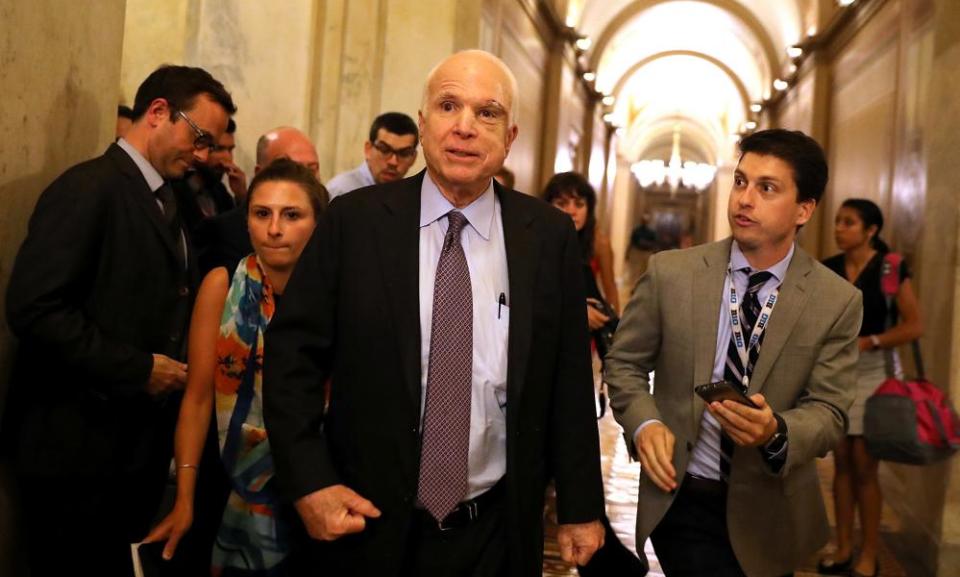Trump attacks McCain and other Republicans over healthcare failure

Donald Trump went on the attack on Twitter on Saturday morning over the latest failure of the Republican-controlled Senate to pass healthcare reform.
In a series of tweets starting at 6.42am, the president attacked Senator John McCain, whom he said had “let Arizona down”; goaded wavering Republicans in an attempt to persuade them to come on board; and praised Graham-Cassidy, the current and controversial plan to repeal the Affordable Care Act (ACA).
On Friday, McCain seemed to quash Republican hopes to push Graham-Cassidy through the Senate before a 30 September deadline, after which it would require a 60-vote super-majority to pass, on the way to making good on a seven-year promise to undo Barack Obama’s signature domestic reform.
In a surprise statement, McCain, the 2008 Republican presidential nominee, said: “I cannot in good conscience vote for the Graham-Cassidy proposal. I believe we could do better working together, Republicans and Democrats, and have not yet really tried.”
McCain joined the Kentucky conservative Rand Paul in stating his intention to vote against the bill. Susan Collins of Maine and Lisa Murkowski of Alaska, moderates who joined McCain in voting down the last attempt at Senate reform, have not confirmed their position, although Collins said on Friday she was “leaning against” it. Republican Senate leadership can only afford to lose two votes to pass Graham-Cassidy before 30 September.
At a Friday night rally on behalf of Alabama senator Luther Strange, who is facing a close primary runoff on Tuesday, Trump said McCain’s opposition to the new bill was “totally unexpected” and “terrible”.
“It was sad,” the president said. “We had a couple of other senators, but at least we knew where they stood. That was really a horrible thing, honestly. That was a horrible thing that happened to the Republican party.”
He amplified his criticism on Saturday, first tweeting: “John McCain never had any intention of voting for this bill, which his Governor [Doug Ducey] loves. He campaigned on Repeal & Replace. Let Arizona down!.”
Trump continued: “Arizona had a 116% increase in ObamaCare premiums last year, with deductibles very high. [Senate minority leader] Chuck Schumer sold John McCain a bill of goods. Sad.”
Referring to Graham-Cassidy’s proposed transfer of healthcare administration away from the federal government, he added: “Large Block Grants to States is a good thing to do. Better control & management. Great for Arizona. McCain let his best friend LG down!”
“LG” was a reference to the South Carolina senator Lindsey Graham, a close friend of McCain and a co-sponsor of the new bill with Bill Cassidy of Louisiana. The proposal would eliminate the expansion of Medicaid, the federal program that provides access to healthcare for low-income Americans under the ACA. It would also enable states to circumvent ACA requirements for coverage of pre-existing conditions.
Trump targeted two other Republicans. “I know Rand Paul and I think he may find a way to get there for the good of the party!” he wrote. The Kentucky senator opposes Graham-Cassidy from the right, believing it leaves too much of the ACA in place.
He also tried to win Murkowski round. “Alaska had a 200% plus increase in premiums under ObamaCare, worst in the country. Deductibles high, people angry! Lisa M comes through,” Trump wrote.
Murkowski has been viewed as the GOP skeptic most likely to change her vote. Republican leaders reportedly promised huge concessions for Alaska.
Despite Trump’s tweets, efforts to pass Graham-Cassidy by the end of the month have stalled. On Friday Senator Joni Ernst, of Iowa, admitted: “I’ll be honest, it seems unlikely that we’ll be voting on this.”
The result is that any healthcare legislation in the near future is likely to be far more modest in scope and will require bipartisan support to reach the 60-vote supermajority needed to avoid a filibuster. There are currently 52 Republican senators and 48 Democrats and allied independents.

 Yahoo News
Yahoo News 